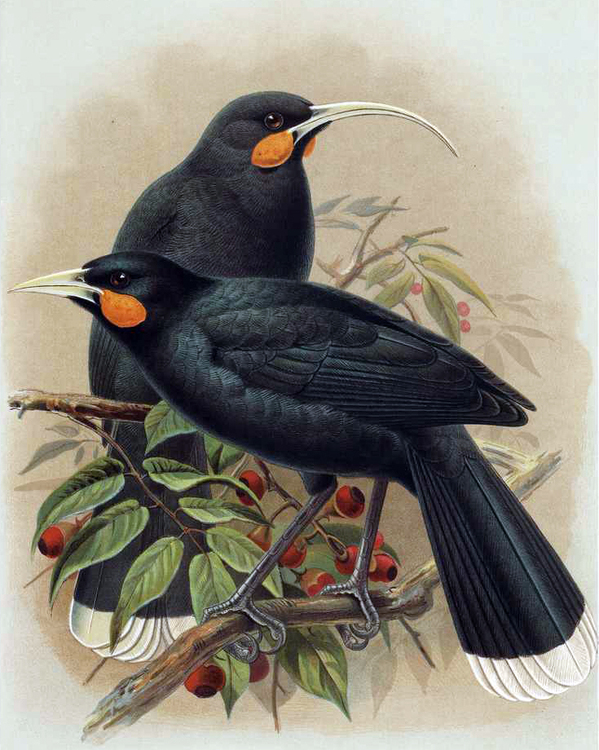
Once upon a time, in the lush forests of New Zealand, there lived a beautiful bird called the huia.
This bird is now extinct.
A couple of weeks ago, a single huia tail feather was sold at an auction for an astonishing NZD$46,521 (US$28,365), making it the most expensive feather ever sold in the world.
The huia was a songbird about the size of a magpie – the largest of New Zealand’s wattlebird species, known for its beautiful song, its predominantly black glossy feathers, and long tail feathers tipped with white. It had orange wattles that grew from the base of the beak and long strong legs which helped it hop, jump, and bound about the forest.
One distinct feature of the huia was its beak. The female had a long thin beak that bent downwards, and the male had a short stubby beak.
There are no photographs of the huia taken while it was still alive. (Maybe you can ask an AI to create one if you are not satisfied with the lovely drawing I used, ha!) They were said to have the most beautiful song in the forest and were the first to begin the early dawn chorus. The Māori named the bird after its loud distress call, described as “a smooth whistle rendered as huia, uia, uia or where are you?”. But they vanished before their call could be recorded, so you can’t hear them anymore. However, there is one recording of a man imitating a huia’s song. This recording was made in 1954 by the New Zealand Broadcasting Corporation of an elderly Māori man named Henare Hemana. Henare, who remembered the song of the huia from his youth, was able to whistle an imitation of it for the recorder. There you go, you can listen here
It is sad. And heartbreaking.
In nature, extinction happens.
There have been mass extinction events in Earth’s history where vast swathes of life were wiped out by events like asteroid strikes, volcanic eruptions, and natural climate shifts. The difference in our time is that many species are extinct or threatened not by natural causes but because of human activity. For the upcoming mass extinction, we humans are entirely at fault.
The Earth is approximately 4.5 billion years old, and we, ‘modern humans,’ have been around for about 200,000 years. Yet in that time, we have fundamentally altered the physical, chemical, and biological systems of the planet on which we and all other organisms depend.
The current era is often called the Anthropocene because of the significant impact humans are having on the planet. It wouldn’t be an exaggeration to call the Anthropocene the age of genocide. During this time, the rate of species extinction might be increasing by up to 1,000%. We are changing the Earth’s systems at full speed as if there is no tomorrow. These changes began with industrialization in the 1800s and have increased exponentially since 1950.
Some estimates suggest that up to one in every eight species worldwide could become extinct due to climate change and human activities. This would make the Anthropocene the deadliest period for life on Earth since the meteor impact that killed the dinosaurs.
Imagine a world where the songs of countless birds have fallen silent and the vibrant colours of wildlife have faded. The massive extinction of species is destroying the planet’s biodiversity, which is essential for all life, including humans. If we don’t want to ruin what has evolved over billions of years and be responsible for what could be easily called genocide, we need to act now.
This is a tough challenge because it involves complex measures affecting our economy, social behaviour, and ethics on both global and local levels. It is a race against extinction, balancing economic development with the need to preserve nature and species.
Last words: We have to stop dominating the world and its wilderness. We have to stop treating nature and animals as our property.
If we don’t change our ways, the next time we see a feather at auction, it might be from another species we’ve driven to extinction. How ironic and tragic would it be if our legacy is nothing more than a collection of pricey relics of the vibrant life we’ve eradicated?